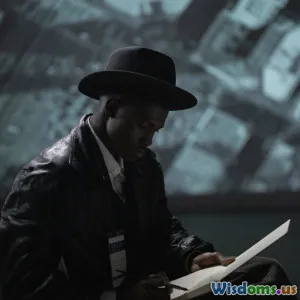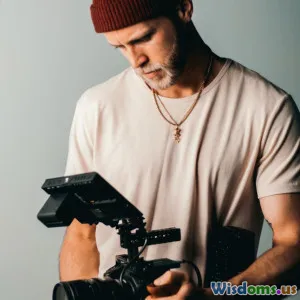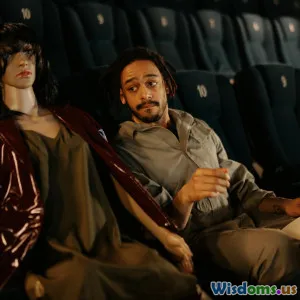Iconic Directors Who Shaped Film History
8 min read Explore the visionary directors who transformed cinema and continue to shape storytelling today. (0 Reviews)Iconic Directors Who Shaped Film History
Film has always been more than just entertainment: it’s an art form that combines storytelling, visual innovation, and human emotion. Over the past century, certain directors have risen above the rest, crafting cinematic experiences so profound and transformative that they have permanently altered how movies are made and perceived. These master filmmakers did not simply make movies; they reshaped film language, influenced cultural perceptions, and pushed the boundaries of imagination and technique.
In this article, we'll journey through the remarkable contributions of some iconic directors whose work has indelibly shaped film history and inspired countless filmmakers across generations.
The Pioneer: Sergei Eisenstein and Montage Theory
Early cinema was primarily about spectacle and novelty, until pioneers like Sergei Eisenstein began exploring cinema’s potential as a language. Eisenstein, a Soviet filmmaker, revolutionized editing techniques with his development of montage — the strategic juxtaposition of shots to create emotional or intellectual impact beyond the content of any single frame.
His 1925 film Battleship Potemkin remains a masterclass in montage editing, particularly the “Odessa Steps” sequence, which builds tension through rapid cuts depicting a massacre. Eisenstein’s theories laid the foundation for narrative cinema and editing as a form of visual rhetoric, influencing generations including Alfred Hitchcock and Martin Scorsese.
"Montage is conflict," Eisenstein famously said, emphasizing clash as a creative force in film.
Birth of the Auteur: Alfred Hitchcock’s Psychological Thrills
Few directors have attained iconic status quite like Alfred Hitchcock, often called the "Master of Suspense." His career spanning over five decades saw the birth of the auteur theory — the idea that a director’s personal vision permeates a film. Hitchcock pioneered the psychological thriller, elevating cinema’s ability to manipulate emotion and suspense.
Films like Psycho (1960) and Vertigo (1958) dissect human fears and desires through meticulous shot composition, innovative camera techniques (like the dolly zoom), and narrative twists that shock viewers yet reveal deep psychological insights.
Hitchcock said: "Drama is life with the dull bits cut out," underlining his skill in distilling tension. His influence extends to modern filmmakers such as David Fincher and Christopher Nolan.
The Visionary Storyteller: Akira Kurosawa and Cinematic Universality
Akira Kurosawa’s epic storytelling and technical mastery bridged Eastern and Western cinema, making him one of the first internationally acclaimed filmmakers from Japan. His films combine samurai traditions with universal themes like honor, loyalty, and survival.
Kurosawa’s Seven Samurai (1954) pioneered the modern action film blueprint and inspired Western adaptations including The Magnificent Seven.
Beyond storytelling, Kurosawa introduced revolutionary techniques like multiple cameras shooting simultaneously to capture dynamic battle scenes and weather effects to amplify mood — practices that are standard today.
His profound impact stretches from George Lucas to Steven Spielberg, underscoring global cross-cultural influences in film.
New Wave Innovators: François Truffaut and the French New Wave
Post-WWII cinema saw a radical shift with filmmakers in France challenging studio norms. François Truffaut was a crucial figure in the French New Wave (La Nouvelle Vague), which emphasized raw, personal filmmaking and experimental narratives.
In The 400 Blows (1959), Truffaut explores adolescent angst with a naturalistic style using handheld cameras and location shooting — both revolutionary departures from glossy studio films. The movement rejected traditional storytelling rigidity and often broke the fourth wall, influencing art-house and indie films globally.
Truffaut’s work inspires filmmakers to prioritize personal voice and realism, helping redefine cinema as a form of self-expression.
Master of the Blockbuster: Steven Spielberg’s Storytelling Genius
In the late 20th century, mainstream cinema found a visionary who could marry artistic ambition with mass appeal: Steven Spielberg. His expertise in combining emotional storytelling with groundbreaking special effects created some of the most successful and beloved films of all time.
Jaws (1975) essentially invented the modern summer blockbuster, blending suspense with spectacular spectacle and creating new marketing strategies for wide releases. Films like E.T. and Schindler’s List showcase his range from heartfelt childhood narratives to harrowing historical dramas.
Spielberg’s influence extends beyond directing into nurturing talents and advancing visual effects technology, profoundly shaping Hollywood’s cinematic landscape.
Breaking Barriers: Kathryn Bigelow and Directorial Diversity
Breaking new ground for women and minorities in directing, Kathryn Bigelow’s career demonstrates the power of diverse perspectives in shaping film history. The first woman to win the Academy Award for Best Director for The Hurt Locker (2008), Bigelow challenged gender norms and redefined action and war film genres with her gritty, immersive style.
Her intense and realistic portrayal of conflict brings nuanced viewpoints often absent from mainstream Hollywood. Bigelow’s work paves the way for broader inclusivity behind the camera, inspiring a new generation of filmmakers to tell complex stories across all genres.
Conclusion: The Ever-Evolving Legacy of Iconic Directors
These directors, among numerous others, illustrate how filmmaking is an evolving dialogue between art, technology, culture, and personal vision. By breaking conventions, innovating techniques, and pushing storytelling boundaries, they shaped not only the movies we watch but also how we understand human experience through cinema.
Today, streaming platforms and digital filmmaking democratize the craft, but the legacies of these iconic figures remain foundational. Aspiring filmmakers and cinephiles alike benefit immensely from studying their work — gaining inspiration to innovate and deepen the power of film as a universal language.
In celebrating these visionaries, we learn that great cinema results from bold vision combined with relentless dedication — qualities that continue to move and unite audiences around the world.
References & Further Reading
- Eisenstein, S. (1949). Film Form: Essays in Film Theory.
- Spoto, D. (1983). The Dark Side of Genius: The Life of Alfred Hitchcock.
- Richie, D. (1998). A Hundred Years of Japanese Film.
- Neupert, R. (2007). A History of the French New Wave Cinema.
- Tarantino, Q. (2021). Interview on Spielberg's influence, The Guardian.
- Smith, R. (2010). Kathryn Bigelow and Gender Politics in Film.
These readings offer deeper insight into these filmmakers’ biographies, stylistic innovations, and lasting cultural impacts.
Rate the Post
User Reviews
Popular Posts



















